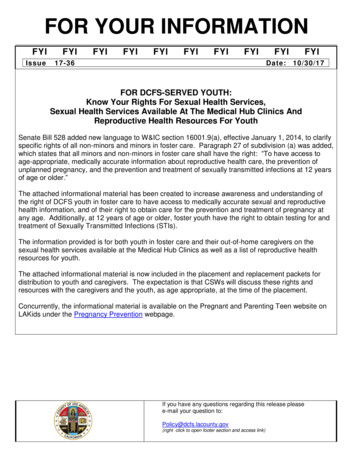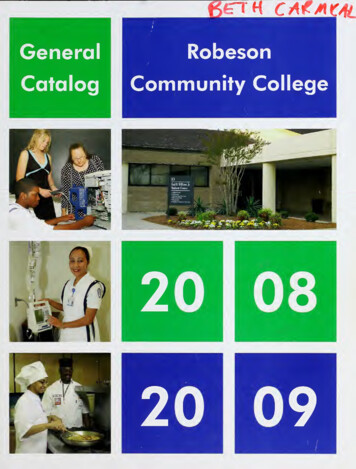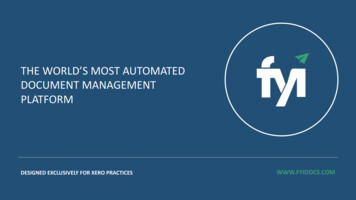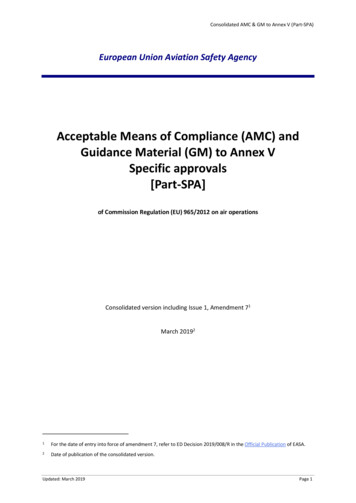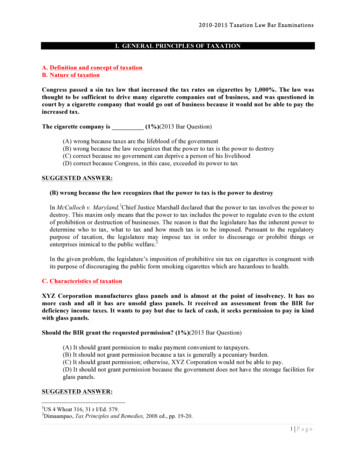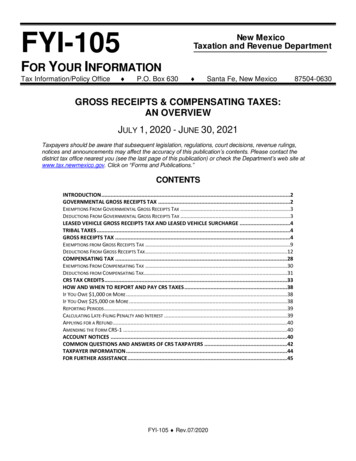
Transcription
FYI-105New MexicoTaxation and Revenue DepartmentFOR YOUR INFORMATIONTax Information/Policy Office P.O. Box 630 Santa Fe, New Mexico87504-0630GROSS RECEIPTS & COMPENSATING TAXES:AN OVERVIEWJULY 1, 2020 - JUNE 30, 2021Taxpayers should be aware that subsequent legislation, regulations, court decisions, revenue rulings,notices and announcements may affect the accuracy of this publication’s contents. Please contact thedistrict tax office nearest you (see the last page of this publication) or check the Department’s web site atwww.tax.newmexico.gov. Click on “Forms and Publications.”CONTENTSINTRODUCTION .2GOVERNMENTAL GROSS RECEIPTS TAX .2EXEMPTIONS FROM GOVERNMENTAL GROSS RECEIPTS TAX .3DEDUCTIONS FROM GOVERNMENTAL GROSS RECEIPTS TAX .3LEASED VEHICLE GROSS RECEIPTS TAX AND LEASED VEHICLE SURCHARGE .4TRIBAL TAXES .4GROSS RECEIPTS TAX .4EXEMPTIONS FROM GROSS RECEIPTS TAX .9DEDUCTIONS FROM GROSS RECEIPTS TAX .12COMPENSATING TAX .28EXEMPTIONS FROM COMPENSATING TAX .30DEDUCTIONS FROM COMPENSATING TAX.31CRS TAX CREDITS .33HOW AND WHEN TO REPORT AND PAY CRS TAXES .38IF YOU OWE 1,000 OR MORE .38IF YOU OWE 25,000 OR MORE .38REPORTING PERIODS .39CALCULATING LATE-FILING PENALTY AND INTEREST .39APPLYING FOR A REFUND .40AMENDING THE FORM CRS-1 .40ACCOUNT NOTICES .40COMMON QUESTIONS AND ANSWERS OF CRS TAXPAYERS .42TAXPAYER INFORMATION .44FOR FURTHER ASSISTANCE .45FYI-105 Rev.07/2020
New Mexico Taxation and Revenue DepartmentINTRODUCTIONThis publication includes a description of gross receipts and compensating taxes; exemptions, deductionsand credits available for each tax; how and when to report and pay the taxes; account notices issued bythe Taxation and Revenue Department (Department); and, finally, responses to frequently askedquestions by taxpayers.This information is a general explanation of the gross receipts and compensating tax laws and ispresented as a service to taxpayers. Because these instructions are intended to provide general guidanceand do not address all specific circumstances, they are not binding on the Department. If you have anyquestions regarding your particular situation, please contact one of the Department's local tax offices, callcenter, or the Santa Fe headquarters.Statutory citations in this publication are to the New Mexico Statutes Annotated (NMSA 1978). The GrossReceipts and Compensating Tax Act is compiled as Sections 7-9-1 through 7-9-117 NMSA 1978."CRS" is the Department's Combined Reporting System. Using Form CRS-1 you can report one or moreof the following taxes:1. Gross Receipts Tax (includes municipal and county taxes)2. Compensating Tax3. Withholding Tax*4. Governmental Gross Receipts Tax5. Interstate Telecommunications Gross Receipts Tax (for more information request FYI-403 fromyour local district tax office or view it online at x6. Leased Vehicle Gross Receipts Tax (for more information request FYI-225 from your local districttax office or view it online at px)7. Leased Vehicle Surcharge8. Tribal Taxes* A description of withholding tax is included in the publication FYI-104 available from your local districttax office. You may also view it online at px.The form used to report these taxes is the Form CRS-1. A supply of these forms is available in the CRS-1Filer's Kit. The kit is mailed out every six months in June and December to all registered taxpayers whodo not file online and contains a six-month supply of Form CRS-1, current gross receipts tax rates, andfrequently requested CRS-related forms. If you did not receive your CRS-1 Filer’s Kit, contact your localdistrict tax office (see FOR FURTHER ASSISTANCE on page 45).Note: Useful publications such as the FYI-402, Taxpayer Remedies and FYI-406, Your Rights Under theTax Law can be located on our website at px or acopy can be obtained from your local district office.GOVERNMENTAL GROSS RECEIPTS TAXFor the privilege of engaging in certain activities by governments, there is a governmental gross receiptstax of 5% imposed on the receipts of New Mexico state and local government agency, institution,instrumentality or political subdivision (except public school districts and an entity licensed by theDepartment of health, other than a hospital, that is principally engaged in providing health care services)from:1. The sale of tangible personal property, other than water, from facilities open to the general public;2. The performance of or admissions to recreational, athletic or entertainment services or events infacilities open to the general public;3. Refuse collection, refuse disposal, or both;4. Sewage services;FYI-105 REV. 07/2020 Page 2
New Mexico Taxation and Revenue Department5. The sale of water by a utility owned or operated by a county, municipality or other politicalsubdivision of the state,6. The renting of parking, docking or tie-down spaces or the granting of permission to park vehicles,tie-down aircraft or dock boats (7-9-4.3);7. The sale of tangible personal property handled on consignment when sold from facilities open tothe general public; and8. A hospital licensed by the Department of Health (report with special code GH).Governmental gross receipts DOES NOT include:1. Cash discounts taken and allowed;2. Governmental gross receipts tax payable on transactions reportable for the period; and3. Any type of time-priced differential.For governmental gross receipts purposes a “facility open to the general public” DOES NOT includepoint-of-sale registers or electronic devices at a bookstore owned or operated by a public post-secondaryeducational institution when the registers or devices are utilized in the sale of textbooks or other materialsrequired for courses at the institution to a student enrolled at the institution who displays a valid studentidentification card.EXEMPTIONS FROM GOVERNMENTAL GROSS RECEIPTS TAXReceipts subject to one of the following taxes are exempt from governmental gross receipts tax: grossreceipts tax; compensating tax; motor vehicle excise tax; gasoline tax; special fuel supplier's tax; the oiland gas emergency school, severance, conservation and ad valorem taxes; resources tax; processorstax; service tax; event center surcharge (7-9-13.5); stadium surcharge (7-9-13.3); athletic facilitysurcharge (7-9-41.1) or the boat excise tax (7-9-13.2). In addition, receipts from the sale of livestock orunprocessed agricultural products are exempt (7-9-18).DEDUCTIONS FROM GOVERNMENTAL GROSS RECEIPTS TAXDeductions that can be claimed under governmental gross receipts are:1. Receipts from selling tangible personal property to manufacturers (7-9-46);2. Receipts from sales of tangible personal property or licenses for resale (including prostheticdevices) (7-9-47 and 7-9-73);3. Receipts from selling tangible personal property to a U.S. or New Mexico governmental entity orto the governing body of an Indian nation, tribe or pueblo for use on the reservation (7-9-54);4. Receipts from selling tangible personal property to 501(c)(3) organizations (7-9-60);5. Receipts from sale of services for resale (7-9-48);6. Receipts from sales in interstate commerce (7-9-55);7. Refunds and uncollectible debts (7-9-67);8. Receipts from sales of prescription drugs, oxygen and oxygen services provided by a licensedMedicare durable medical equipment provider (7-9-73.2);9. 60% of receipts of hospitals licensed by the Department of Health may be deducted (7-9-73.1);and10. Receipts for sales, leases and licenses of tangible personal property, sales of licenses and saleof services or licenses for use of real property that are facilitated by a marketplace provider;provided that the marketplace provider will collect and remit the tax associated with thetransactions.For further information on these deductions see “Deductions from Gross Receipts Tax” on page 12 or seea “List of Deductions” beginning on page 14.Although the governmental gross receipts tax is included in the Gross Receipts and Compensating TaxAct and reportable in the same fashion as gross receipts and compensating taxes, it is an entirelyseparate tax. The location code used by government agencies for reporting purposes is 55-055.FYI-105 REV. 07/2020 Page 3
New Mexico Taxation and Revenue DepartmentLEASED VEHICLE GROSS RECEIPTS TAX AND LEASED VEHICLESURCHARGEIn addition to gross receipts tax, a leased vehicle gross receipts tax of 5% is imposed on the receipts of alessor of automobiles when:1. The lease is for a term of six months or less;2. The automobile is part of a fleet of five or more leased vehicles;3. The vehicle is a passenger automobile that will accommodate six or fewer adults; and4. The lessor acquired the automobile on or after July 1, 1991.The location code for leased vehicle gross receipts tax is 44-444.A 2-per-day leased vehicle surcharge is also imposed except when the vehicle is leased to a person whosigns a statement that the vehicle is being rented to temporarily replace a vehicle that is being repaired,serviced or replaced. Report the regular gross receipts tax, the leased vehicle gross receipts tax and theleased vehicle surcharge on the Form CRS-1. Also, see FYI-225: Short-Term Leased vehicles available fromyour local district tax office or view it online at px.The location code for the leased vehicle surcharge is 44-455.TRIBAL TAXESThe Department has entered into agreements with the Acoma, Cochiti, Kewa, Laguna, Nambe, OhkayOwingeh, Picuris, Pojoaque, San Ildefonso, Sandia, Santa Ana, Santa Clara, Taos, Tesuque, ZuniPueblos, and the Jicarilla Apache Nation to collect a tax imposed by these tribes. The Department hasalso entered into cooperative agreements with the Albuquerque Indian School District Governing Boardand the Santa Fe Indian School.The Department is authorized to enter into similar agreements with all nineteen New Mexico Pueblos andthe Mescalero Apache Tribe.GROSS RECEIPTS TAXWHAT IS GROSS RECEIPTS?"Gross receipts" means the total amount of money or the value of other consideration received fromselling property in New Mexico, leasing or licensing property employed in New Mexico, from granting aright to use a franchise employed in New Mexico, performing services in New Mexico or selling researchand development services performed outside New Mexico the product of which is initially used in NewMexico. Gross receipts includes receipts from:1.2.3.4.5.6.Sales of tangible personal property handled on consignment;Commissions received;Amounts paid by members of any cooperative association;Amounts received by persons providing telephone or telegraph services;Fees received by persons for serving as disclosed agents for another;Amounts received by a New Mexico florist from the sale of flowers, plants, etc., thatare filled and delivered outside New Mexico by an out-of-state florist;7. Providing intrastate mobile telecommunications services (i.e., the services originateand terminate in the same state) to customers whose place of primary use is in NewMexico; and8. Amounts collected by a marketplace provider engaging in business in the state fromsales, leases and licenses of tangible personal property, sales of licenses and salesof services or license for use of real property that are sourced to New Mexico by amarketplace provider on behalf of a marketplace seller(s) regardless if themarketplace seller(s) are engaging in business in New Mexico.Gross receipts DOES NOT include:FYI-105 REV. 07/2020 Page 4
New Mexico Taxation and Revenue Department1. Tax billed to the buyer (i.e., gross receipts tax, governmental gross receipts tax, leased vehicle grossreceipts tax, interstate telecommunications gross receipts tax and local option taxes).2. Cash discounts allowed and taken. Example: When a seller offers 2% off for paying cash or for paying within a certain time frame andthe buyer takes advantage of the offer, the gross receipts amount is the amount actually received(sales price less 2%). However, Manufacturers' coupons redeemable by the seller, i.e. a grocerystore, are not cash discounts allowed and taken since the seller will be reimbursed for the face valueof the coupon. Gross receipts includes cash received plus the value of the coupon.3. Gross receipts or sales tax imposed by an Indian nation, tribe or pueblo if the Indian nation, tribe orpueblo if the Indian Nation, tribe or pueblo has a similar exclusion for New Mexico gross receipts tax.4. Any type of time-price differential, such as interest or a reduced sale price for pay.5. Amounts received solely on behalf of another in a disclosed agency capacity.6. Amounts received by a New Mexico florist from the sale of flowers, plants, etc., where the sale is theresult of orders placed with an out-of-state florist for filling and delivery in New Mexico by a NewMexico florist.WHAT IS THE GROSS RECEIPTS TAX?The gross receipts tax is a tax on persons engaged in business in New Mexico for the privilege of doingbusiness in New Mexico. The tax is imposed on the gross receipts of persons who:1. Sell property in New Mexico; Property includes real property; tangible personal property, including electricity and manufacturedhomes, licenses, including licenses of digital goods, (other than the licenses of copyrights,trademarks, or patents) and franchises.2. Perform services in New Mexico; Service includes construction activities and all construction materials that will become part of theconstruction project.3. Lease or license property employed in New Mexico;4. Grant a right to use a franchise employed in New Mexico; or5. Sell research and development services performed outside New Mexico when the product of theservice is initially used in New Mexico.NOTE: Starting July 1, 2019, when billing a customer, the tax must be separately stated or a statementmust be provided to the customer indicating that the gross receipts tax is included in the billed amount.ENGAGING IN BUSINESS“Engaging in business” means carrying on or causing to be carried on any activity with the purpose ofdirect or indirect benefit. For those that lack physical presence in New Mexico, including a marketplaceprovider, it means having at least 100,000 of taxable gross receipts from sales, leases and licenses oftangible personal property, sale of licenses and sales of services and licenses for use of real propertysourced to New Mexico in the previous calendar year.WHAT IS THE GROSS RECEIPTS TAX RATE AND HOW IS IT DETERMINED?FYI-105 REV. 07/2020 Page 5
New Mexico Taxation and Revenue DepartmentThe gross receipts tax rate varies throughout the state from 5.125% to 9.4375%. The total rate is acombination of the rates imposed by:1. The state,2. The counties, and3. The municipalities.The total gross receipts tax is paid to the state. The state keeps its portion and distributes the counties'and municipalities' portions to them.The state's portion of the gross receipts tax, which is also the largest portion of the tax, is determined bystate law. Changes to the state rate occur no more than once a year, usually in July.The counties' portion of gross receipts tax is determined by the county commissions. These incrementscan go into effect in January and July of every year.Municipal councils determine the municipalities' portion of gross receipts tax. Like the counties, changescan go into effect in January and July of every year.Because the combined gross receipts tax rate can change effective January and July of every year, theDepartment issues a new tax rate schedule twice a year and include it in the CRS-1 Filer's Kit. You canalso view the tax rate schedule online at storicrates.aspx. Always check the gross receipts tax rate schedule to see if the rate for your businesslocation(s) has changed. Due to the frequency of tax rate changes, the Department does not send outseparate notices of changes.BUSINESS LOCATION DETERMINES TAX RATEGenerally, the gross receipts tax rate is based on the business location of the seller or lessor, NOT on thelocation of the buyer or lessee. If your business is located in Albuquerque and you deliver or lease tosomeone in Santa Fe, you are liable for tax at the Albuquerque rate.For reporting purposes, business locations are broken down by county, municipality, tribal entity or districton the tax rate schedule. Here are some guidelines for determining your business location.1. If you are in the construction business, your tax rate is determined by the location of eachconstruction project.2. If you are in the business of selling real estate, your business location is the location of each propertysold.3. If you are a utility, your tax rate is determined by the location of the meter used to record the amountof service consumed by the customer or the location of the telephone set. For cellular service, it is thelocation of the customer’s place of primary use.4. If you are located in a municipality within a county, your rate is that of the municipality.5. If you are outside any incorporated municipality, your rate is that of the county.6. If you have more than one store within one municipality or county, e.g., three stores in Las Cruces,you have only one business location (Las Cruces) for reporting purposes.7. If you have no business location in New Mexico but you have a resident salesperson, your businesslocation is the location of the salesperson.8. If you have no business location or resident salesperson but are liable for gross receipts tax (forinstance, because you lease property used in New Mexico or perform a non-construction service inNew Mexico), you are liable for tax at the rate for out-of-state businesses, the state gross receipts taxrate of 5.125%. Use the out-of-state business location code, 88-888.FYI-105 REV. 07/2020 Page 6
New Mexico Taxation and Revenue Department9. If you have multiple business locations under one identification number, you should report thereceipts for each location separately on a single Form CRS-1 and be sure the tax rate matches thelocation by checking the gross receipts tax rate schedule.10. If you are a craftsperson who sells at craft fairs where you rent a booth, because you can beexpected to be found at the booth for the duration of the fair, that booth is a business location andyour tax rate is based on the location of the crafts fair.11. In some counties, more than one location code exists for land owned by a municipality but located inthat part of the county outside all municipalities. Examples: State Fairgrounds in Bernalillo County,Santa Clara Pueblo in Rio Arriba and Santa Fe Counties. Use the codes for these specific areas whenyour location is in one of them.12. Receipts from a nonprofit hospital licensed by the Department of Health. The exemption is only fromthe local option portion of gross receipts taxes. The state gross receipts tax rate of 5.125% must bepaid. To report these receipts use special code NH (Column B).In some instances, a specific location code may be required when completing the Form CRS-1 in orderto report a certain type of tax or type of receipts. Below are some of those situations.1.If you are located outside New Mexico and sell research and development services the product ofwhich is initially used in New Mexico, use the state rate, 5.125%. Use the special business locationcode of 77-777 for those transactions only.2.If you transact business with tribal non-members on tribal territory, use the tribal location of the saleor delivery rather than your principle business location if that tribe or pueblo has entered into acooperative agreement with New Mexico. Evidence that a tribe, pueblo or nation has entered into acooperative agreement is a separate location listed on the Gross Receipts Tax Rate Schedule.3.If you sell uranium hexafluoride and your receipts are deductible under Section 7-9-90, use thespecial business location code of D0-001 to report your deductible receipts.4.If you sell tangible personal property to a manufacturer who incorporates the property as aningredient or component part of a manufactured product and your receipts are deductible underSection 7-9-46(A), use special business location code of D0-002 to report your deductible receipts.5.If you sell tangible personal property that is consumed in the manufacturing process and yourreceipts are deductible under Section 7-9-46(B), use the special business location code of D0-003to report your deductible receipts.6.If you transmit electricity and provide ancillary services and your receipts are deductible underSection 7-9-103.1, use the special business location code of D0-004 to report your deductiblereceipts.7.If you operate a market or exchange for the sale or trade of electricity and your receipts aredeductible under Section 7-9-103.2, use the special business location code of D0-005 to reportyour deductible receipts.8.If you sell agricultural implements, vehicles or aircraft and your receipts are deductible underSection 7-9-62(A), use the special business location code of D0-006 to report your deductiblereceipts.9.If you sell aircraft, provide flight support and training and your receipts are deductible underSection 7-9-62(B), use the special business location code of D0-007 to report your deductiblereceipts.FYI-105 REV. 07/2020 Page 7
New Mexico Taxation and Revenue Department10. If you sell aircraft parts, provide maintenance services for aircraft and aircraft parts and yourreceipts are deductible under Section 7-9-62(C), use the special business location code of D0008 to report your deductible receipts.11. If you sell or provide services for commercial and military aircraft and your receipts are deductibleunder Section 7-9-62.1, use the special business location code of D0-009 to report yourdeductible receipts.13. If you provide health care services to Medicare beneficiaries and your receipts are deductibleunder Section 7-9-77.1(A), use the special business location code of D0-010 to report yourdeductible receipts.13. If you provide health care services as a third-party administrator for the TRICARE program andyour receipts are deductible under Section 7-9-77.1(B), use the special business location code ofD0-011 to report your deductible receipts.14. If you provide health care services to Indian Health Service beneficiaries and your receipts aredeductible under Section 7-9-77.1(C), use the special business location code of D0-012 to reportyour deductible receipts.15. If you are a clinical laboratory and provide health care services to Medicare beneficiaries and yourreceipts are deductible under Section 7-9-77.1(D), use the special business location code of D0013 to report your deductible receipts.16. If you are a home health agency and provide medical, other health and palliative services toMedicare beneficiaries and your receipts are deductible under Section 7-9-77.1(E), use thespecial business location code of D0-014 to report your deductible receipts.17. If you are a dialysis facility and you provide medical and other health services to Medicarebeneficiaries and your receipts are deductible under Section 7-9-77.1(F), use the specialbusiness location code of D0-015 to report your deductible receipts.18. If you sell or rent durable medical equipment or medical supplies and your receipts are deductibleunder Section 7-9-73.3, use the special business location code of D0-016 to report your deductiblereceipts.19. If you perform research and development, test and evaluation services at New Mexico major rangeand test facility bases and your receipts are from military transformational acquisition programs anddeductible under Section 7-9-94, use the special business location code of D0-017 to report yourdeductible receipts.20. If you sell goods and services to the United States Department of Defense related to directed energyor satellites and your receipts are deductible under Section 7-9-115, use the special businesslocation code of D0-018 to report your deductible receipts. (Available prior to January 1, 2031).21. If you are a trade-support company and have receipts from business activities and operations at thebusiness' border location and your receipts are deductible under Section 7-9-56.3, use the specialbusiness location code of D0-019 to report your deductible receipts.22. Small Business Saturday Gross Receipts Tax Holiday - If you are a qualified small business andhave receipts from the sale at retail of certain tangible personal property specified under Section 7-9116 during the period beginning at 12:01 A.M. on the first Saturday after Thanksgiving and ending atmidnight on the same Saturday and the business did not employee more than ten employees at anyone time during the previous fiscal year, use the special business location code of D0-020 to reportyour deductible receipts. (Available July 1, 2018 until July 1, 2025).23. If you sell construction services to implement a fighter aircraft pilot training mission project at a NewMexico military installation and your receipts are deductible under Section 7-9-106, use the specialFYI-105 REV. 07/2020 Page 8
New Mexico Taxation and Revenue Departmentbusiness location code of D0-021 to report your deductible receipts. (Available July 1, 2018 until July1,2022).DETERMINING TAXABILITY OF GROSS RECEIPTSGross receipts are taxable, exempt, or deductible. If your receipts do not fall under any exemption ordeduction, those receipts are taxable. The exemptions and deductions from gross receipts tax that followare grouped in categories, e.g., agriculture, construction, government entity, for convenient reference.Where helpful, we have included an example of the application of the exemption or deduction. In caseswhere an exception to qualifying for the exemption or deduction exists, we have included the exception.Please refer to the Gross Receipts and Compensating Tax Act and regulations for specifics onexemptions and deductions from gross receipts tax. A regulation book can be obtained from the NewMexico Compilation Commission, http://www.nmcompcomm.us/index.html.EXEMPTIONS FROM GROSS RECEIPTS TAXWHAT IS AN EXEMPTION?Exemptions from gross receipts tax are receipts which are not taxable and do not have to be reported.Therefore, if all your receipts are exempt, you do not have to register with the Department for grossreceipts tax purposes (you may have to register for withholding tax or to obtain nontaxable transactioncertificates, though) nor do you have to report those receipts on the Form CRS-1. However, if you haveexempt, deductible and taxable receipts, you should register and report only the deductible and taxablereceipts on the Form CRS-1. For administrative purposes, receipts on which no state tax may be imposedbecause of federal preemption are considered exempt.FEDERAL PREEMPTIONIn some cases, federal law bars New Mexico from imposing its tax on transactions, which, but for thepreemption, would be subject to tax. For example, federal law prohibits the application of state and localgross receipts tax to many transactions with Indian nations, tribes or pueblos or their agencies ormembers if the transaction takes place on the tribe's territory. Receipts from transactions with nonmembers, even when on a tribe's territory, are not preempted. If you are uncertain whether preemptionapplies to your transaction(s), contact the Department. NOTE: this preemption does not apply to taxes imposed by an Indian nation, tribe or pueblo.New Mexico is also
FYI-105 Rev.07/2020 FYI-105 New Mexico Taxation and Revenue Department FOR YOUR INFORMATION Tax Information/Policy Office P.O. Box 630 Santa Fe, New Mexico 87504-0630
